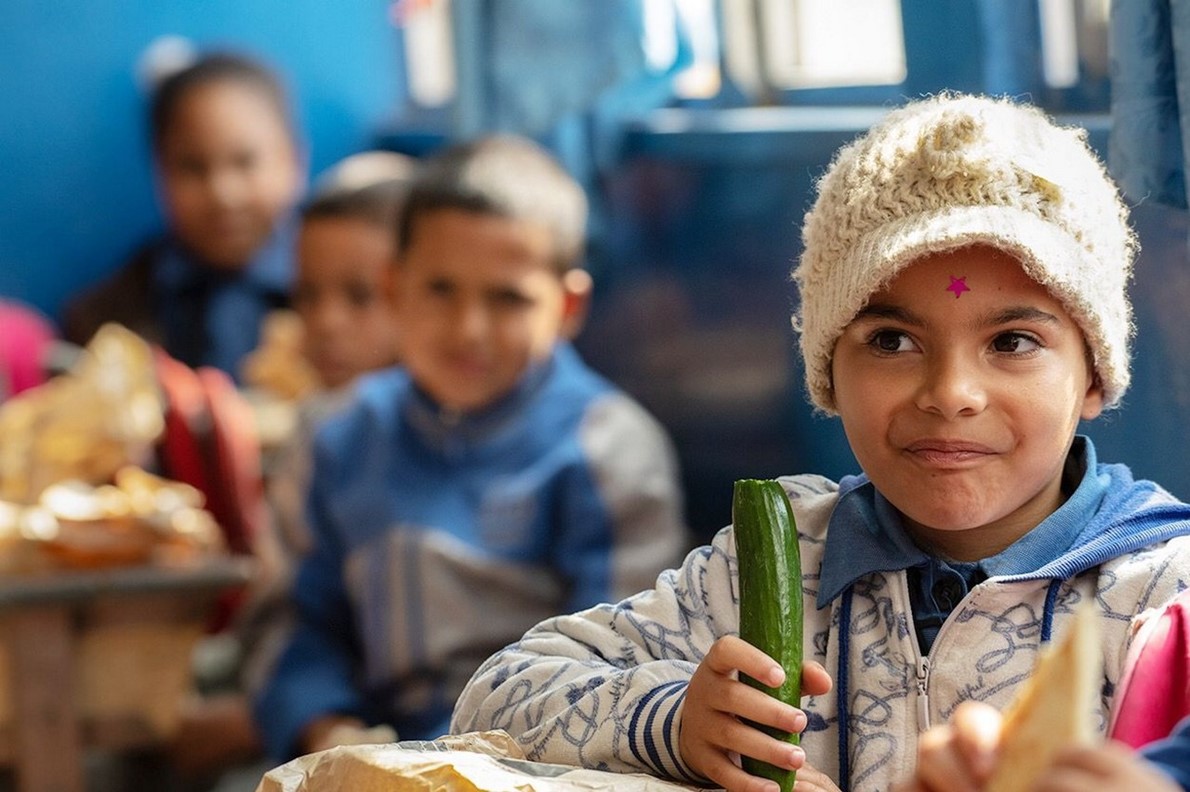AMMAN – The UN World Food Program (WFP), in partnership with the Ministry of Education (MoE) and the World Bank,
recently announced the preliminary findings of the impact evaluation for the
National School Feeding Program.
The evaluation comprised two main components.
The first examines whether children receiving the healthy meals experience
greater benefits than those receiving fortified date bars. The second component
explores whether women employed by the program, responsible for preparing the
meals in community kitchens, experience any changes in their socio-economic
development compared with women who were not offered a job by the program.
Preliminary results indicate that the healthy meal model enhances children’s
school attendance, dietary diversity, and energy levels. Among female kitchen
workers, the findings reveal increased income, a greater willingness to
participate in the labor market, and more openness among male spouses regarding
female earnings.
“The impact evaluation reveals concrete improvements for vulnerable children and dedicated kitchen workers.”
Minister of Education Dr. Azmi Mahafzah, emphasized “Balanced nutrition positively impacts students in various
ways – physically, mentally, psychologically, and socially. It boosts
motivation to learn, curiosity, and exploration, forming the foundation for
overall growth. Healthy students, as a result, become the core of a society
that can actively contribute to economic and social development while
addressing issues like poverty, unemployment, and diseases.”
Meanwhile, WFP Representative and
Country Director Alberto Correira Mendes said “The impact evaluation reveals
concrete improvements for vulnerable children and dedicated kitchen workers.”
Mendez added that annually fruits and
vegetables from nearly 1,500 local smallholder farmers, support the livelihoods
of 450 bakers and workers, and employ 1,250 women in 50 kitchens across Jordan.
Introduced in 2022, the healthy meal
model provides nutritious school meals, including a freshly baked pastry,
fruit, and a vegetable, to 90,000 vulnerable Jordanian and refugee children
between the ages of 5 and 12 enrolled in public schools across six governorates.
The meal ingredients are sorted and packaged daily in eleven community-based
kitchens, providing formal employment to 250 vulnerable women. WFP and MoE also
provide nutrition education, encouraging healthy eating habits among children
and their parents.
“The National School Feeding Program is the primary social safety net in Jordan that supports both vulnerable Jordanians and refugees by providing them equal benefits through a single delivery system, irrespective of nationality.”
Ananda Paez, Social Protection and
School Feeding Team Lead at WFP Jordan told Jordan News “The National School
Feeding Program prioritizes schools within poverty pockets. The Department of Statistics (DOS) generates a comprehensive list highlighting communities where
at least 25 percent of the population lives below the national poverty line.
The Ministry of Education (MoE) then identifies all public schools operating in
those areas and includes them in the program, serving children from
kindergarten to sixth grade.”
Paez added “The National School
Feeding Program is the primary social safety net in Jordan that supports both
vulnerable Jordanians and refugees by providing them equal benefits through a
single delivery system, irrespective of nationality.”
Lama Al Majali, Program Policy Officer
– Nutrition, WFP Jordan told Jordan News “The National School Feeding Program
offers children a portion of their daily nutritional needs. The date bar is
fortified with vitamins and minerals, including iron, and the healthy meal
provides nutritional value from more diverse foods. For maximum impact, WFP and
MoE are implementing a nutrition education component alongside healthy school
meals, aiming to enhance nutrition knowledge and improve dietary habits for
children beyond the classroom, ultimately contributing to enhanced health
status.”
She noted that the National School
Feeding Program contributes to reducing children's reliance on school canteens,
offering satisfying and filling meals.
Read more Features
Jordan News
(window.globalAmlAds = window.globalAmlAds || []).push('admixer_async_509089081')
(window.globalAmlAds = window.globalAmlAds || []).push('admixer_async_552628228')
Read More
The influence of war on Gaza on Jordanian commerce during Ramadan
Jordan's market during Ramadan: Coping with war and economic pressures
Empowering Arab youth with HTUX.ORG
AMMAN – The UN
World Food Program (WFP), in partnership with the
Ministry of Education (MoE) and the World Bank,
recently announced the preliminary findings of the impact evaluation for the
National School Feeding Program.
The evaluation comprised two main components.
The first examines whether children receiving the healthy meals experience
greater benefits than those receiving fortified date bars. The second component
explores whether women employed by the program, responsible for preparing the
meals in community kitchens, experience any changes in their socio-economic
development compared with women who were not offered a job by the program.
Preliminary results indicate that the healthy meal model enhances children’s
school attendance, dietary diversity, and energy levels. Among female kitchen
workers, the findings reveal increased income, a greater willingness to
participate in the labor market, and more openness among male spouses regarding
female earnings.
“The impact evaluation reveals concrete improvements for vulnerable children and dedicated kitchen workers.”
Minister of Education Dr.
Azmi Mahafzah, emphasized “Balanced nutrition positively impacts students in various
ways – physically, mentally, psychologically, and socially. It boosts
motivation to learn, curiosity, and exploration, forming the foundation for
overall growth. Healthy students, as a result, become the core of a society
that can actively contribute to economic and social development while
addressing issues like poverty, unemployment, and diseases.”
Meanwhile, WFP Representative and
Country Director Alberto Correira Mendes said “The impact evaluation reveals
concrete improvements for vulnerable children and dedicated kitchen workers.”

Mendez added that annually fruits and
vegetables from nearly 1,500 local smallholder farmers, support the livelihoods
of 450 bakers and workers, and employ 1,250 women in 50 kitchens across Jordan.
Introduced in 2022, the healthy meal
model provides nutritious school meals, including a freshly baked pastry,
fruit, and a vegetable, to 90,000 vulnerable Jordanian and refugee children
between the ages of 5 and 12 enrolled in public schools across six governorates.
The meal ingredients are sorted and packaged daily in eleven community-based
kitchens, providing formal employment to 250 vulnerable women. WFP and MoE also
provide nutrition education, encouraging healthy eating habits among children
and their parents.
“The National School Feeding Program is the primary social safety net in Jordan that supports both vulnerable Jordanians and refugees by providing them equal benefits through a single delivery system, irrespective of nationality.”
Ananda Paez, Social Protection and
School Feeding Team Lead at WFP Jordan told
Jordan News “The National School
Feeding Program prioritizes schools within poverty pockets. The
Department of Statistics (DOS) generates a comprehensive list highlighting communities where
at least 25 percent of the population lives below the national poverty line.
The Ministry of Education (MoE) then identifies all public schools operating in
those areas and includes them in the program, serving children from
kindergarten to sixth grade.”
Paez added “The National School
Feeding Program is the primary social safety net in Jordan that supports both
vulnerable Jordanians and refugees by providing them equal benefits through a
single delivery system, irrespective of nationality.”

Lama Al Majali, Program Policy Officer
– Nutrition, WFP Jordan told
Jordan News “The National School Feeding Program
offers children a portion of their daily nutritional needs. The date bar is
fortified with vitamins and minerals, including iron, and the healthy meal
provides nutritional value from more diverse foods. For maximum impact, WFP and
MoE are implementing a nutrition education component alongside healthy school
meals, aiming to enhance nutrition knowledge and improve dietary habits for
children beyond the classroom, ultimately contributing to enhanced health
status.”
She noted that the National School
Feeding Program contributes to reducing children's reliance on school canteens,
offering satisfying and filling meals.
Read more Features
Jordan News



